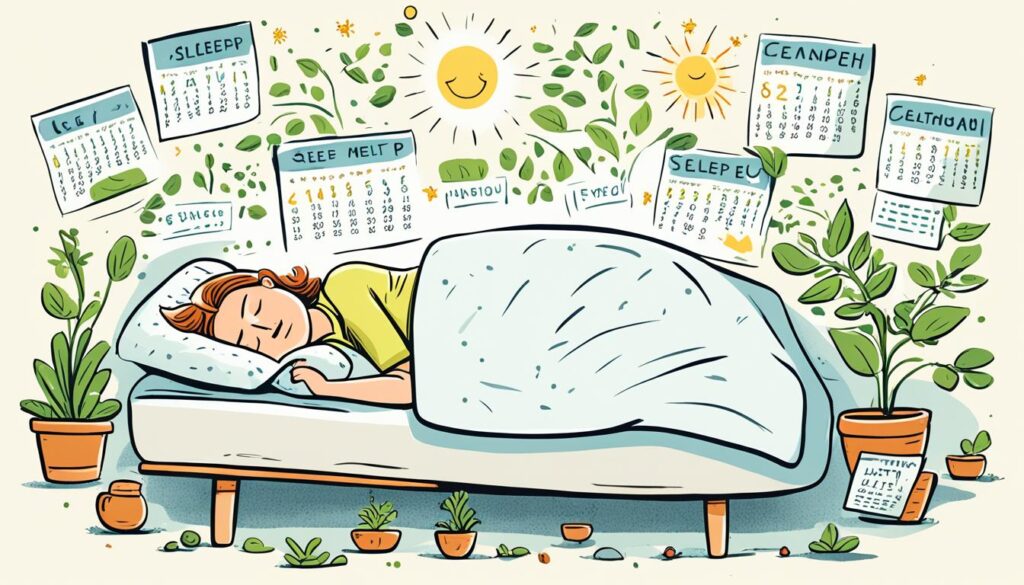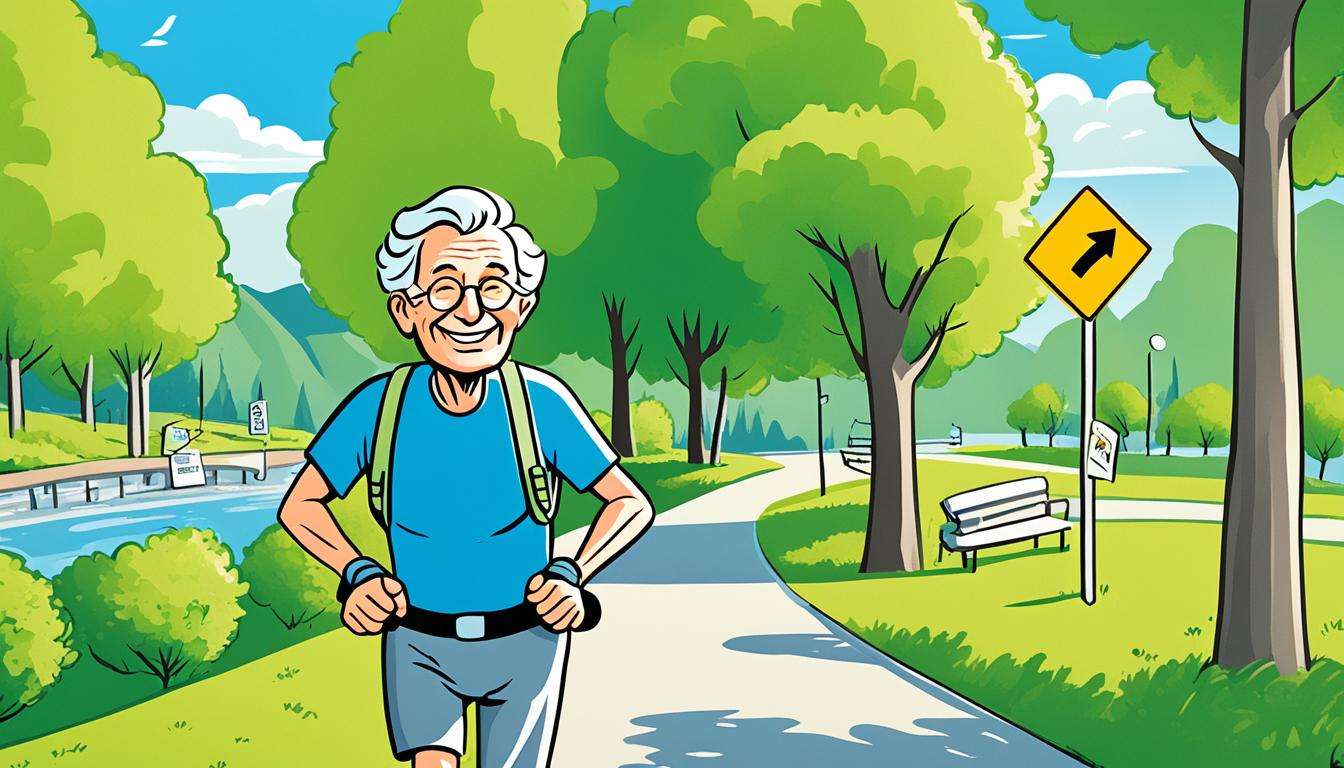Medically reviewed by Dr Chandril Chugh,
Renowned Neurologist and American Trained Specialist
Aging gracefully is about more than just appearance. It’s about living your best life and maintaining your physical and mental health as you age. This article will provide 12 tips for healthy aging and maintaining mobility, helping you embrace your golden years with vitality and independence.
As you age, it’s important to prioritize your physical and mental well-being. By adopting healthy habits and making positive lifestyle choices, you can enhance your longevity and maintain your mobility. Here are 12 tips to help you age gracefully:
Key Takeaways:
- Protect your skin from the sun with sunscreen and protective clothing.
- Stay hydrated and use gentle products in your skincare routine.
- Exercise regularly to maintain mobility and prevent chronic diseases.
- Follow a healthy diet that includes fruits, vegetables, lean protein, whole grains, and healthy fats.
- Prioritize your mental health by maintaining social connections and engaging in enjoyable activities.
Be kind to your skin
Taking care of your skin is essential for healthy aging. Proper skin care can help prevent premature aging, maintain a youthful appearance, and protect against skin cancers. Here are some tips to help you prioritize your skin health:
1. Wear sunscreen
Protect your skin from harmful UV rays by applying sunscreen with a high SPF (Sun Protection Factor) daily. Make sure to choose a broad-spectrum sunscreen that protects against both UVA and UVB rays. Apply it generously at least 15 minutes before going outside and reapply every two hours or more frequently if sweating or swimming.
2. Use protective clothing
In addition to sunscreen, protect your skin by wearing hats, sunglasses, and clothing that covers your arms and legs. This helps create an extra barrier against the sun’s damaging rays.
3. Stay hydrated
Hydration is essential for maintaining healthy skin. Drink plenty of water throughout the day to keep your skin hydrated from the inside out. Hydrated skin is less prone to dryness and wrinkles.
4. Follow a gentle skin care routine
Choose gentle products that are suitable for your skin type when it comes to cleansers, moisturizers, and other skin care products. Avoid harsh chemicals or fragrances that can irritate your skin. Consider consulting with a dermatologist for personalized recommendations.
5. Get regular skin cancer screenings
Yearly skin cancer screenings are crucial for early detection and treatment of skin cancers. Dermatologists can examine your skin for any suspicious moles, growths, or changes that may indicate skin cancer. Early detection greatly increases the chances of successful treatment.
By being kind to your skin and adopting a consistent skin care routine, you can maintain a healthy and youthful complexion while reducing the risk of skin cancer.
| Skin Care Tips | Benefits |
|---|---|
| Wear sunscreen | Protection against harmful UV rays |
| Use protective clothing | Extra barrier against sun damage |
| Stay hydrated | Prevention of dryness and wrinkles |
| Follow a gentle skin care routine | Reduced risk of skin irritation |
| Get regular skin cancer screenings | Early detection of skin cancers |
6. Exercise regularly
Regular exercise is crucial for maintaining mobility and preventing chronic diseases. The Department of Health & Human Services recommends the following exercise recommendations:
- 2.5 to 5 hours per week of moderate-intensity exercise
- 1.25 to 2.5 hours per week of vigorous-intensity aerobic exercise
In addition to aerobic exercise, it is important to incorporate muscle-strengthening activities into your routine. This helps to improve overall strength and mobility.
There are various physical activities you can engage in to stay active. Some recommendations include:
- Walking
- Swimming
- Dancing
- Cycling
These activities can be enjoyed individually or as part of a group. Find activities that you enjoy and that fit into your lifestyle. Remember, staying active not only improves mobility but also plays a vital role in disease prevention and promoting overall health.

Exercise Recommendations
| Exercise Type | Intensity | Duration |
|---|---|---|
| Aerobic Exercise | Moderate | 2.5 to 5 hours per week |
| Aerobic Exercise | Vigorous | 1.25 to 2.5 hours per week |
| Muscle-Strengthening Activities | N/A | Regularly |
7. Mind your diet
A healthy diet plays a crucial role in aging gracefully and maintaining optimal health. By incorporating a variety of nutritious foods into your meals, you can nourish your body and promote overall well-being.
Here are some key components of a healthy diet:
- Fruits and vegetables: Enjoy a colorful array of fruits and vegetables to provide essential vitamins, minerals, and antioxidants. Aim for a minimum of 5 servings per day to support your immune system and protect against chronic diseases.
- Lean protein sources: Include lean meats, poultry, fish, eggs, legumes, and nuts in your diet to provide the building blocks for muscle growth and repair. Protein also helps to keep you feeling full and satisfied.
- Whole grains: Opt for whole grains such as brown rice, quinoa, whole wheat bread, and oats to provide fiber, B-vitamins, and minerals. Whole grains help to stabilize blood sugar levels and promote digestive health.
- Low-fat or fat-free dairy: Incorporate low-fat or fat-free dairy products like milk, yogurt, and cheese to obtain calcium and vitamin D for bone health. Choose unsweetened or plain varieties to avoid excess sugar.
- Healthy fats: Include sources of healthy fats like avocados, nuts, seeds, and olive oil. These fats provide essential fatty acids and help to support brain health, reduce inflammation, and improve heart health.
When planning your meals, it’s important to avoid processed foods, refined sugars, and excessive salt. These foods can contribute to weight gain, inflammation, and an increased risk of chronic diseases. Pay attention to portion sizes and maintain a balanced diet to achieve the best results.
Remember, a healthy diet is not about restriction or deprivation, but rather about nurturing your body with wholesome, nourishing foods. By making mindful food choices, you can support healthy aging and enhance your overall well-being.
| Nutrient | Recommended Daily Intake |
|---|---|
| Calories | Varies based on age, sex, and activity level |
| Protein | 50 grams (g) for adults |
| Fiber | 25 grams (g) for women, 38 grams (g) for men |
| Calcium | 1,000 milligrams (mg) for adults |
| Vitamin C | 75–90 milligrams (mg) for adults |
| Iron | 8 milligrams (mg) for men, 18 milligrams (mg) for women |
8. Prioritize mental health
Maintaining good mental health is essential for healthy aging. Taking care of your mental well-being is just as important as taking care of your physical health. There are several ways you can prioritize your mental health to ensure a happy and fulfilling life as you age.
1. Cultivate social connections
Social connections play a vital role in our overall well-being. Spending quality time with friends and loved ones can help reduce feelings of loneliness and isolation. Engaging in meaningful conversations and activities with others fosters a sense of belonging and boosts your mood.
2. Embrace a positive attitude about aging
Embracing your age with a positive attitude can significantly impact your mental health. Instead of focusing on the negative aspects of aging, concentrate on the wisdom and experiences you have gained over the years. Embrace the opportunities that come with age and celebrate the journey.
3. Engage in enjoyable activities
Engaging in activities you enjoy is a great way to reduce stress and promote happiness. Whether it’s pursuing a hobby, engaging in creative endeavors, or participating in sports or exercise, doing something you love brings joy and fulfillment to your life.
4. Practice stress reduction techniques
Stress can take a toll on your mental and physical health. Incorporate stress reduction techniques into your daily routine to promote a sense of calm and well-being. This can include practicing mindfulness, deep breathing exercises, or engaging in activities that help you relax and unwind.

| Activity | Benefits |
|---|---|
| Yoga | Reduces stress, increases flexibility, improves mental clarity |
| Meditation | Calms the mind, enhances self-awareness, reduces anxiety |
| Journaling | Provides emotional release, promotes self-reflection and introspection |
| Listening to music | Elevates mood, reduces stress, improves cognitive function |
9. Stay physically active
A sedentary lifestyle can have detrimental effects on your health, increasing the risk of chronic illnesses and premature death. To combat these risks, it’s essential to incorporate regular physical activity into your daily routine. By staying physically active, you can improve your overall well-being and maintain a healthier lifestyle.
The dangers of a sedentary lifestyle
A sedentary lifestyle, characterized by prolonged periods of sitting or inactivity, can contribute to various chronic illnesses such as heart disease, diabetes, obesity, and even certain types of cancer. Studies have shown that individuals with sedentary behavior are more likely to experience early death compared to those who engage in regular physical activity.
To counteract the harmful effects of a sedentary lifestyle, it is crucial to find ways to keep yourself moving throughout the day.
Engaging in physical activities
One excellent way to stay physically active is by incorporating walking into your routine. Walking for at least 30 minutes a day can have numerous health benefits, including improved cardiovascular health, increased muscle strength, and enhanced mental well-being.
Another effective way to stay active is by participating in group exercise classes. These classes offer a fun and engaging environment where you can exercise alongside others, boosting motivation and social interaction. Whether it’s dancing, aerobics, or yoga, group exercise classes provide a fantastic opportunity to get moving while enjoying the company of others.
Benefits of regular physical activity
Regular physical activity offers a wide range of benefits beyond preventing chronic illnesses. Engaging in regular exercise can help you maintain a healthy weight, improve your sleep quality, boost your energy levels, and enhance your mood.
By incorporating physical activity into your daily routine, you can experience increased mobility, improved balance and coordination, and a higher overall quality of life.
| Benefits of Regular Physical Activity |
|---|
| Reduces the risk of chronic illnesses |
| Improves cardiovascular health |
| Enhances muscle strength and flexibility |
| Boosts mood and mental well-being |
| Supports weight management |
| Improves sleep quality |
With the myriad of benefits that regular physical activity provides, it’s clear that staying physically active is vital for maintaining your overall health and well-being.
10. Reduce stress levels
Chronic stress can have a significant impact on your physical and mental well-being. It is essential to manage stress effectively for a healthier and happier life. Here are some relaxation techniques and strategies to help you reduce your stress levels:
- Practice meditation: Allocate a few minutes each day to sit quietly and focus your attention on your breath. Meditation has been proven to calm the mind, reduce stress, and promote overall well-being.
- Try breathing exercises: Deep breathing exercises, such as diaphragmatic breathing or box breathing, can help activate the body’s relaxation response, reduce stress, and promote a sense of calmness.
- Engage in yoga: Yoga combines physical postures, controlled breathing, and meditation, making it an effective practice for stress management. It can help improve flexibility, increase mindfulness, and promote relaxation.
- Get enough sleep: Adequate sleep is essential for stress reduction. Aim for 7-8 hours of quality sleep each night to rejuvenate your body and mind. Establish a regular sleep schedule and create a relaxing bedtime routine to improve your sleep hygiene.
- Seek social support: Connect with friends, family, or support groups who can provide a listening ear and offer guidance during stressful times. Social support can help you alleviate stress, gain perspective, and foster a sense of belonging.
- Engage in activities you enjoy: Find time for hobbies, leisure activities, and enjoyable experiences that bring you joy and provide a break from the pressures of daily life. Engaging in activities you love can help alleviate stress and promote a positive mindset.
By incorporating these stress management techniques into your routine, you can enhance your overall well-being and experience greater calmness and resilience in the face of stressors.

11. Quit smoking and limit alcohol consumption
Smoking and excessive alcohol consumption can have detrimental effects on your health, leading to premature aging and increasing the risk of various diseases. To prioritize your well-being and longevity, it’s important to take proactive steps to quit smoking and moderate your alcohol intake.
Tobacco Cessation
Quitting smoking is one of the best decisions you can make for your health. It can significantly reduce your risk of heart disease, lung cancer, and other smoking-related illnesses. Take advantage of the available resources and support systems to help you on your journey to smoking cessation. From nicotine replacement therapies to counseling services, there are many tools that can assist you in overcoming the addiction.
Alcohol Moderation
While moderate alcohol consumption can sometimes have health benefits, excessive drinking can lead to a range of health issues, such as liver disease, heart problems, and increased cancer risks. It’s crucial to adhere to the recommended alcohol limits to safeguard your well-being. Women should have no more than one drink per day, while men should have no more than two drinks per day.
By quitting smoking and limiting your alcohol consumption, you can protect yourself from premature aging, mitigate the risk of various diseases, and promote a healthier, more vibrant future.
12. Get enough sleep
Getting an adequate amount of sleep is crucial for both your physical and mental well-being. As an adult, aim for 7-8 hours of sleep per night to ensure optimal rest and rejuvenation. Sufficient sleep has numerous benefits that contribute to a healthier lifestyle.
- Lower risk of heart disease and stroke: Studies have shown that consistent sleep duration is associated with a reduced risk of developing heart disease and stroke. By prioritizing your sleep, you’re taking a proactive step towards maintaining a healthy cardiovascular system.
- Reduced stress and depression: Sufficient sleep plays a significant role in stress reduction and the prevention of mood disorders such as depression. It allows your body and mind to recover, recharge, and better cope with daily challenges.
- Improved focus and concentration: A good night’s sleep enhances cognitive function, including focus, concentration, and memory retention. By prioritizing sleep, you’ll find yourself more alert and productive throughout the day.
- Overall well-being: Adequate sleep contributes to your overall sense of well-being. It promotes better mood, emotional stability, and a stronger immune system, allowing you to navigate life’s challenges with greater resilience.
Make sleep a priority in your daily routine. Establish a relaxing bedtime routine, create a comfortable sleep environment, and limit exposure to electronic devices that can interfere with your sleep quality. By getting enough sleep, you’re investing in your long-term health and enhancing your ability to lead a fulfilling and vibrant life.

13. Foster new hobbies and interests
Engaging in new hobbies and interests can enhance your sense of purpose and keep you mentally and emotionally engaged. Pursue purposeful activities that bring you leisure and joy, and foster social engagement to cultivate happiness in your life.
Exploring the Great Outdoors
Spending time in nature is not only refreshing but also a great way to discover new hobbies. Whether it’s hiking, birdwatching, gardening, or photography, immersing yourself in the beauty of the natural world can provide a sense of peace and fulfillment.
Volunteering for a Cause
Engaging in volunteer work allows you to contribute to a purposeful project or organization while creating meaningful connections with like-minded individuals. Whether you choose to work with the elderly, children, animals, or the environment, volunteering can give you a sense of fulfillment and make a positive impact on your community.
Image: Embrace joy and fulfillment by fostering new hobbies and interests
Conclusion
Embracing healthy aging is the key to living a vibrant and fulfilling life in your golden years. By implementing the 12 tips provided in this article, you can cultivate vitality, independence, and joy as you age.
Make healthy habits a priority in your daily routine. Exercise regularly, eat a balanced diet, and take care of your skin. Prioritize your mental health by fostering social connections, adopting a positive attitude, and engaging in enjoyable activities. Stay physically active, reduce stress levels, and quit smoking while moderating alcohol consumption.
Remember to prioritize self-care and seek professional help when needed. Take control of your aging journey and make the necessary adjustments to ensure a healthy and happy life. By embracing a lifestyle that promotes healthy aging, you can enjoy your golden years to the fullest, with vitality, independence, and joy.
FAQ
Why is healthy aging important?
Healthy aging is important because it allows you to live your best life and maintain your physical and mental health as you age. It promotes vitality, independence, and joy in your golden years.
How can I take care of my skin as I age?
To take care of your skin as you age, it’s essential to protect it from the sun by wearing sunscreen and protective clothing. Stay hydrated and use gentle products in your skincare routine. Additionally, get yearly skin cancer screenings to catch any potential issues early.
What exercise recommendations should I follow for healthy aging?
The Department of Health & Human Services recommends 2.5 to 5 hours per week of moderate-intensity exercise or 1.25 to 2.5 hours per week of vigorous-intensity aerobic exercise for healthy aging. Muscle-strengthening activities should also be done regularly.
What should I include in a healthy diet for aging gracefully?
A healthy diet for aging gracefully should include fruits and vegetables, lean protein sources, whole grains, low-fat or fat-free dairy, and healthy fats. Avoid processed foods, refined sugars, and excessive salt. Pay attention to portion sizes and maintain a balanced diet for optimal health.
How can I prioritize my mental health as I age?
To prioritize your mental health as you age, it’s important to spend time with friends and loved ones, as meaningful relationships and a strong social network contribute to overall well-being. Embrace your age and maintain a positive attitude about aging. Engage in activities you enjoy and that bring you joy to reduce stress and promote happiness.
Why is staying physically active crucial for healthy aging?
Staying physically active is crucial for healthy aging because a sedentary lifestyle can lead to chronic illness and an increased risk of early death. Engaging in activities like walking, participating in group exercise classes, or other activities that keep you moving is essential for maintaining your overall health and well-being.
How can I reduce stress levels for healthy aging?
To reduce stress levels for healthy aging, practice relaxation techniques such as meditation, breathing exercises, or yoga. Get adequate sleep, talk to friends or loved ones for support, and engage in activities that bring you joy to reduce stress and improve your overall well-being.
Why should I quit smoking and limit alcohol consumption for healthy aging?
Quitting smoking and limiting alcohol consumption is essential for healthy aging because smoking and excessive alcohol consumption can contribute to premature aging and increase the risk of various diseases. It’s recommended that women have no more than one drink per day, while men should have no more than two drinks per day.
How much sleep should I get for healthy aging?
To promote physical and mental health, aim for 7-8 hours of sleep per night as an adult. Sufficient sleep lowers the risk of heart disease and stroke, reduces stress and depression, improves focus and concentration, and contributes to overall well-being.
How can fostering new hobbies and interests enhance healthy aging?
Fostering new hobbies and interests can enhance healthy aging by enhancing your sense of purpose and keeping you mentally and emotionally engaged. Pursue activities you enjoy, spend time in nature, volunteer, or explore new hobbies to bring joy and fulfillment to your life.
















Leave a Comment